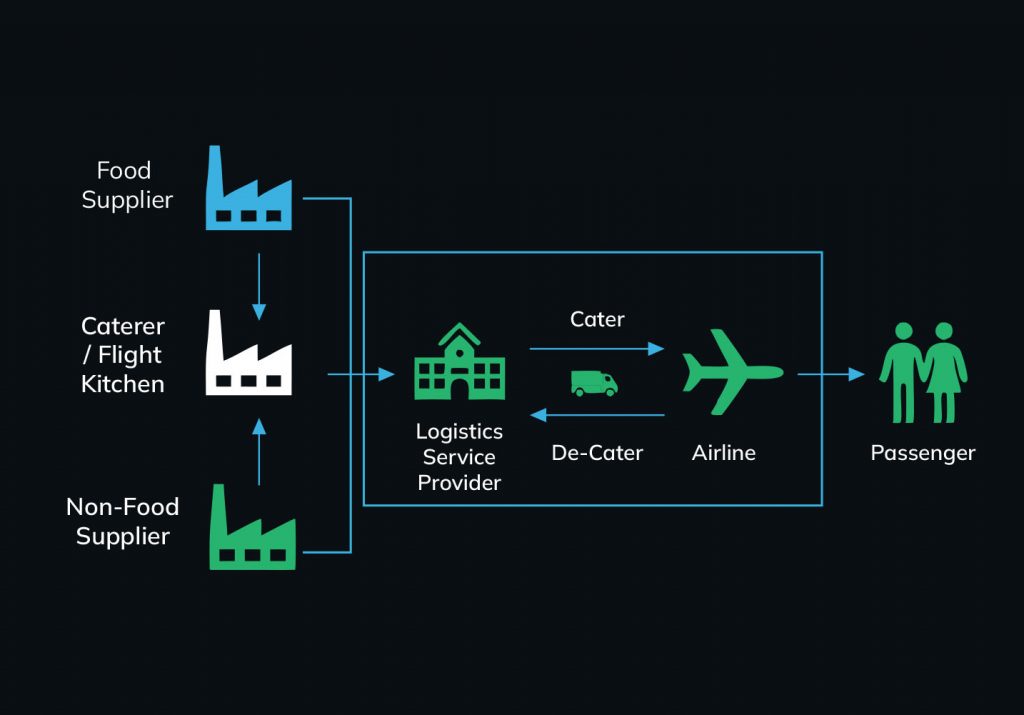Inflight catering in business aviation is a critical component that significantly impacts the overall passenger experience, operational efficiency, and safety. The global inflight catering market is projected to reach USD 35.75 billion by 2032, growing at a compound annual growth rate (CAGR) of 11.32% from 2024 to 2032. This substantial growth reflects the increasing demand for personalized and high-quality meal solutions, particularly within the specialized sector of business aviation.

Modular Meal Planning and Customization
Passenger satisfaction hinges on the ability to provide tailored inflight dining experiences. Unlike the standardized offerings of commercial aviation, business jet catering demands detailed customization.
Integration of Passenger Data
- Use of Passenger Service Systems (PSS) integrated with Electronic Flight Bag (EFB) software to relay dietary preferences, allergies, and cultural requirements in real time.
- Automated flagging systems for restricted ingredients (e.g., shellfish for passengers with allergies).
Client-Specific Standards
- Certification of kosher, halal, or vegan meal preparation using verified suppliers.
- Pre-approval of menu designs through digital mock-ups sent to passengers or their representatives for feedback.
To illustrate, a Gulfstream G650 is scheduled for a multi-leg journey with stops at London Luton Airport (EGGW), Dubai International Airport (DXB), and Chhatrapati Shivaji Maharaj International Airport (BOM). The catering order includes a kosher meal for one passenger, a gluten-free diet for another, and a high-protein meal for a third. The flight operator uses an integrated dietary compliance system to transmit meal specifications to suppliers at each destination.
In London, the operator works with a catering partner certified by the London Beth Din Kashrut Division (KLBD) to ensure the kosher meal meets all requirements. At Dubai, the operator coordinates with a supplier that adheres to the Emirates Authority for Standardization and Metrology (ESMA) halal certification standards while confirming that gluten-free meals are compliant with Dubai Municipality’s Food Safety Department. In Mumbai, sourcing gluten-free alternatives involves pre-approval from suppliers compliant with Food Safety and Standards Authority of India (FSSAI) guidelines.
Supply Chain Management and Risk Mitigation
Managing the catering supply chain across international boundaries can be challenging for flight operators. The risks associated with perishables, regulatory compliance, and logistics must be proactively mitigated.
Cold Chain Management Systems
- IoT-enabled refrigeration units for tracking real-time temperature fluctuations.
- Automatic alerts for deviations beyond ±2°C to ensure corrective actions are taken immediately.
Regulatory Databases
- Software solutions integrated with IATA and local customs databases to identify restrictions on importing specific items (e.g., raw meats into the UAE or unpasteurized cheeses into the U.S.).
By way of example, a flight departing from Charles de Gaulle Airport (CDG) to John F. Kennedy International Airport (JFK) requires caviar and specialty cheeses. The flight operator uses a regulatory compliance platform integrated with the U.S. Food and Drug Administration (FDA) and Customs and Border Protection (CBP) databases to ensure the cheeses meet U.S. pasteurization standards.
To expedite customs clearance for the caviar, the operator collaborates with a certified customs broker and employs Electronic Export Information (EEI) filings for pre-clearance. The cold chain is maintained using RFID-enabled insulated containers equipped with real-time temperature sensors. Monitoring stations are set up at the catering supplier’s facility near CDG, the FBO at JFK, and onboard the aircraft, ensuring that the food remains below 5°C (41°F) throughout the process.
Ground Operations and Just-in-Time Delivery
Ground operations are where flight operators face the greatest time pressures. Catering must arrive at the aircraft precisely when needed, minimizing ground time while maintaining quality.
Delivery Scheduling Algorithms
- Use of predictive algorithms based on flight schedules, factoring in potential delays, ramp congestion, and customs processing times.
- Synchronization with FBO ground services for efficient airside access.
RFID Tracking for Real-Time Updates
- Provides flight operators with a live feed of the catering vehicle’s location.
- Ensures that the catering team is airside within the pre-defined delivery window.
Consider the case of a Bombardier Global 7500 scheduled to depart from Teterboro Airport (TEB) at 9:00 AM, with a catering order placed at 11:00 PM the previous night. Just Aviation supports the operation by ensuring seamless coordination of ground handling and catering delivery timelines.
Using RFID-tagged delivery containers, the real-time journey of the catering truck from the kitchen in Newark to the TEB ramp is monitored. Ramp access timing is adjusted based on live location updates, ensuring the catering arrives by 7:30 AM. Just Aviation oversees that the food complies with Hazard Analysis Critical Control Point (HACCP) protocols and performs a final quality assurance check before loading, ensuring a smooth and timely departure.
Schedule Variability and Contingency Planning
The dynamic nature of business aviation frequently disrupts predefined catering plans. Flight operators must maintain flexibility to address sudden changes, such as delays, passenger additions, or route deviations.
Dynamic Inventory Management
- Centralized inventory systems that track perishable stock levels and availability at various supplier hubs.
- Pre-positioning high-demand items (e.g., fresh fruit, beverages) at strategic FBOs.
Rapid Reordering Protocols
- Pre-negotiated agreements with local suppliers for expedited provisioning.
- Use of on-demand delivery services for last-minute orders.
Think of a situation where a flight departing from Dubai International Airport (DXB) to Singapore Changi Airport (SIN) is delayed by four hours due to technical maintenance. The catering provider flags that the pre-ordered seafood platter will exceed its maximum holding time of 8 hours due to the delay.
Using real-time catering management support, the operator relays updated specifications to the provider for a fresh batch of meals. The seafood is sourced from a local supplier near DXB and prepared in a temperature-controlled kitchen certified by the Dubai Food Code. The new meals are delivered directly to the ramp in temperature-controlled vehicles and handed over to ground staff equipped with digital temperature monitoring devices. The updated catering schedule is synced with the flight plan to ensure no further disruptions.
Schedule Variability and Contingency Planning
The dynamic nature of business aviation frequently disrupts predefined catering plans. Flight operators must maintain flexibility to address sudden changes, such as delays, passenger additions, or route deviations.
Dynamic Inventory Management
- Centralized inventory systems that track perishable stock levels and availability at various supplier hubs.
- Pre-positioning high-demand items (e.g., fresh fruit, beverages) at strategic FBOs.
Rapid Reordering Protocols
- Pre-negotiated agreements with local suppliers for expedited provisioning.
- Use of on-demand delivery services for last-minute orders.
Just Aviation is dedicated to delivering efficient and reliable solutions for the complexities of ground handling and flight planning. By integrating technology and operational expertise, we streamline workflows to meet the demands of modern aviation. We specialize in catering operations, accommodating a range of requests, including vegetarian and vegan options, healthy and diet meals, gluten-free meals, and meals for individuals with food allergies. Just Aviation serves charter brokers, private jet operators, flight schools, airlines, and FBOs. With Just Aviation, you can count on innovative strategies designed to optimize every aspect of your catering operations and overall flight experience.
